Hyundai Tucson vs Toyota Aygo – Differences & prices compared
Compare performance, boot space, consumption and price in one view.
Find out now: which car is the better choice for you – Hyundai Tucson or Toyota Aygo?
The Hyundai Tucson (SUV) comes with a Diesel MHEV, Petrol MHEV, Petrol, Full Hybrid or Plugin Hybrid engine and Automatic or Manuel transmission. In comparison, the Toyota Aygo (SUV) features a Petrol engine with Manuel or Automatic transmission.
When it comes to boot capacity, the Hyundai Tucson offers 620 L, while the Toyota Aygo provides 231 L – depending on how much space you need. If you’re looking for more power, decide whether the 252 HP of the Hyundai Tucson or the 72 HP of the Toyota Aygo suits your needs better.
In terms of consumption, the values are 1 L per 100 km for the Hyundai Tucson, and 4.80 L for the Toyota Aygo.
Price-wise, the Hyundai Tucson starts at 30600 £, while the Toyota Aygo is available from 15500 £. Compare all the details and find out which model fits your lifestyle best!
Hyundai Tucson
The Hyundai Tucson is a standout choice in the compact SUV segment, offering a perfect blend of style, comfort, and practicality. Its modern design is complemented by a spacious interior that provides ample room for passengers and luggage alike. With advanced technology and safety features, the Tucson ensures a smooth and enjoyable driving experience.
details @ hyundai.news
@ hyundai.news
 @ hyundai.news
@ hyundai.news
 @ hyundai.news
@ hyundai.news
 @ hyundai.news
@ hyundai.news
 @ hyundai.news
@ hyundai.news
Toyota Aygo
The Toyota Aygo presents itself as a compact city car, perfect for navigating tight urban spaces with ease. Its stylish design is complemented by a vibrant variety of colour options, making it a standout choice for those looking to express their individuality. Inside, the Aygo offers a comfortable and functional cabin, equipped with modern features that enhance the overall driving experience.
details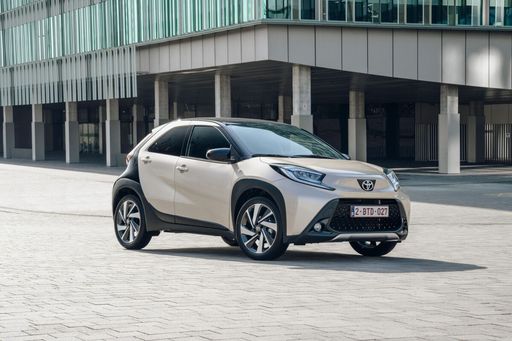 @ Toyota
@ Toyota
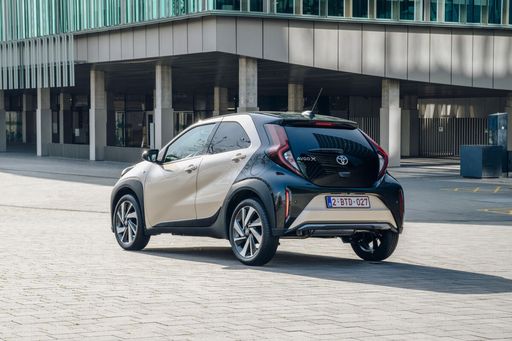 @ Toyota
@ Toyota
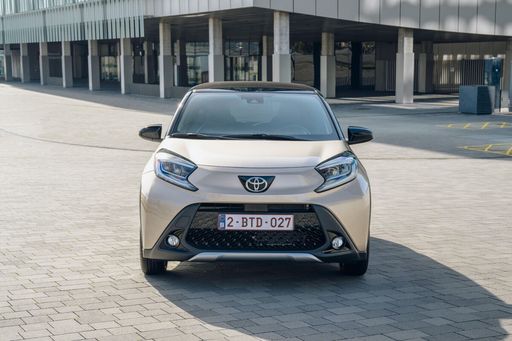 @ Toyota
@ Toyota
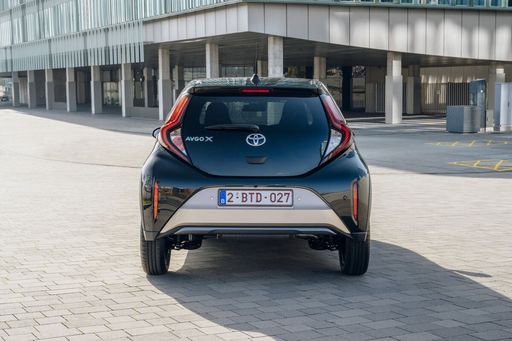 @ Toyota
@ Toyota
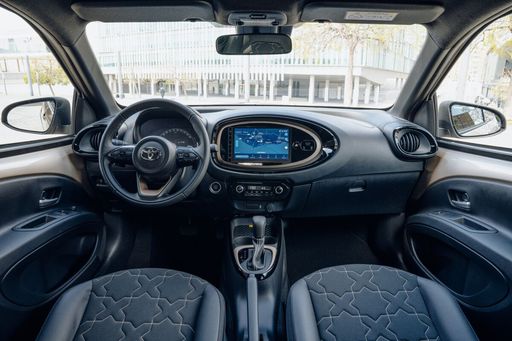 @ Toyota
@ Toyota
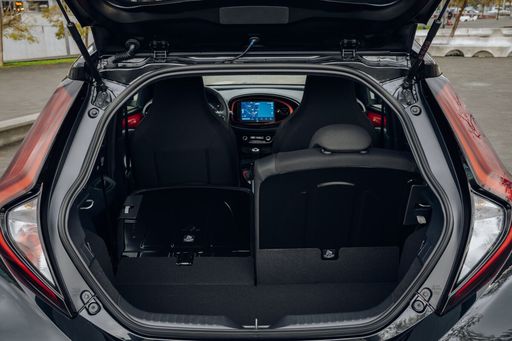 @ Toyota
@ Toyota

|

|
|
|
|
Costs and Consumption |
|
|---|---|
|
Price
30600 - 46300 £
|
Price
15500 - 21200 £
|
|
Consumption L/100km
1 - 6.9 L
|
Consumption L/100km
4.8 - 4.9 L
|
|
Consumption kWh/100km
-
|
Consumption kWh/100km
-
|
|
Electric Range
64 - 70 km
|
Electric Range
-
|
|
Battery Capacity
-
|
Battery Capacity
-
|
|
co2
22 - 156 g/km
|
co2
108 - 111 g/km
|
|
Fuel tank capacity
42 - 54 L
|
Fuel tank capacity
35 L
|
Dimensions and Body |
|
|---|---|
|
Body Type
SUV
|
Body Type
SUV
|
|
Seats
5
|
Seats
4
|
|
Doors
5
|
Doors
5
|
|
Curb weight
1520 - 1889 kg
|
Curb weight
1015 kg
|
|
Trunk capacity
546 - 620 L
|
Trunk capacity
231 L
|
|
Length
4510 - 4520 mm
|
Length
3700 mm
|
|
Width
1865 mm
|
Width
1740 mm
|
|
Height
1650 mm
|
Height
1510 mm
|
|
Payload
525 - 545 kg
|
Payload
345 kg
|
Engine and Performance |
|
|---|---|
|
Engine Type
Diesel MHEV, Petrol MHEV, Petrol, Full Hybrid, Plugin Hybrid
|
Engine Type
Petrol
|
|
Transmission
Automatic, Manuel
|
Transmission
Manuel, Automatic
|
|
Transmission Detail
Dual-Clutch Automatic, Manual Gearbox, Automatic Gearbox
|
Transmission Detail
Manual Gearbox
|
|
Drive Type
Front-Wheel Drive, All-Wheel Drive
|
Drive Type
Front-Wheel Drive
|
|
Power HP
136 - 252 HP
|
Power HP
72 HP
|
|
Acceleration 0-100km/h
7.9 - 11.6 s
|
Acceleration 0-100km/h
15.5 - 15.6 s
|
|
Max Speed
180 - 194 km/h
|
Max Speed
151 - 158 km/h
|
|
Torque
265 - 367 Nm
|
Torque
93 Nm
|
|
Number of Cylinders
4
|
Number of Cylinders
3
|
|
Power kW
100 - 185 kW
|
Power kW
53 kW
|
|
Engine capacity
1598 cm3
|
Engine capacity
998 cm3
|
General |
|
|---|---|
|
Model Year
2024
|
Model Year
2024 - 2025
|
|
CO2 Efficiency Class
E, F, D, B
|
CO2 Efficiency Class
C
|
|
Brand
Hyundai
|
Brand
Toyota
|
Hyundai Tucson
Introducing the Hyundai Tucson: An SUV with Innovation at its Core
The Hyundai Tucson has long been synonymous with reliability, comfort, and exceptional value. With its 2024 model, this popular SUV has taken a bold leap forward by incorporating cutting-edge technology, efficient powertrains, and striking design. Let's delve into the technical details and innovations that make the Hyundai Tucson a standout in the crowded SUV market.
Dynamic Engine Options: Power Meets Efficiency
The Tucson offers a range of powertrains, ensuring there is a model perfect for every driver. Whether you're looking for the fuel efficiency of a mild-hybrid diesel or the power of a plug-in hybrid, the Tucson has you covered. The engine options include:
- Diesel Mild-Hybrid: Combining efficiency with robust performance.
- Benzin Mild-Hybrid: Offering a balance between economy and power.
- Voll-Hybrid: Delivering impressive power while maintaining low fuel consumption.
- Plug-in Hybrid: Offering electric-only driving capabilities with a range of up to 65 km.
These engines are paired with either a manual or automatic transmission, catering to different driving preferences.
Performance and Handling: Experience the Drive
The performance of the Hyundai Tucson is designed to impress, with power outputs ranging from 136 to 252 PS. The Tucson accelerates from 0-100 km/h in as little as 8.1 seconds, managed by precise transmission options such as the dual-clutch and traditional automatic gearboxes. With both front-wheel and all-wheel drive options, the Tucson assures stability and control in varied driving conditions.
Interior and Technology: Comfort Meets Cutting-Edge Innovation
The Tucson's interior is a haven of comfort and technology. With a length ranging up to 4520 mm and a spacious boot capacity of 620 litres, practicality is at the forefront. The intuitive infotainment system includes advanced connectivity features, while driver-assist technologies enhance safety and convenience on every journey.
The choice of luxurious trims and finishes, combined with ergonomic design, ensures that every drive is a pleasure, whether you're on a daily commute or an extended adventure.
Environmental Considerations: Efficiency and Sustainability
Hyundai has made notable strides in ensuring that the Tucson is as environmentally friendly as possible. Models with CO2 emissions as low as 27 g/km place it amongst the leaders in its class for eco-friendly driving. The array of hybrid options further complements Hyundai's commitment to sustainability, providing consumers with green alternatives without compromising performance.
Conclusion: The Hyundai Tucson Is More Than Just an SUV
The 2024 Hyundai Tucson is more than just a means of transport—it's a statement of modernity. It reflects Hyundai's dedication to innovation, efficiency, and comfort, all wrapped up in a stylish and versatile SUV. Whether you're tech-savvy, eco-conscious, or performance-oriented, the Tucson proves to be an ideal choice for forward-thinking drivers.
Toyota Aygo
The Urban Maverick: Exploring the Toyota Aygo
The Toyota Aygo has long been a favourite for city dwellers and those who appreciate a compact yet stylish vehicle. With its latest iterations, the Aygo promises to deliver a blend of efficiency, modernity, and cutting-edge technology. Let's take a closer look at what this impressive vehicle has to offer.
Under the Bonnet: Technical Specifications
At the heart of the Toyota Aygo is a 1.0-litre three-cylinder engine. This petrol-powered engine is capable of producing 72 PS (53 kW) and offers a maximum torque of 93 Nm. The efficient engine achieves a fuel consumption of just 4.8 to 4.9 L/100km, making it an economical choice for urban commuting. The car features a front-wheel-drive layout and is available with either a manual transmission or a CVT automatic gearbox, providing flexibility for various driving preferences.
Performance on the Road
Despite its compact size, the Toyota Aygo offers a respectable acceleration from 0 to 100 km/h in just 15.5 to 15.6 seconds, with a top speed ranging between 151 and 158 km/h. This makes it well-suited for both city driving and highway cruising. The car's lightweight design of 1,015 kg ensures nimble handling and manoeuvrability in tight urban environments.
Design and Dimensions
The Aygo's contemporary exterior design is both attractive and functional. It measures 3,700 mm in length, 1,740 mm in width, and 1,510 mm in height, offering a compact footprint without sacrificing interior space. With five doors and four seats, the Aygo is practical for everyday use. The vehicle provides a boot space of 231 litres, ensuring you have enough room for groceries and luggage on the go.
Innovation and Features
The Toyota Aygo is equipped with a range of innovative features, enhancing the driving experience. Available in several trim levels including Business Edition, Explore, and Style, each comes with its own unique set of features. Standard offerings across trims include advanced safety features, a modern infotainment system, and optional extras such as climate control and advanced connectivity options.
Environmental Considerations and Efficiency
In line with environmental consciousness, the Toyota Aygo carries a CO2 efficiency class of C, with emissions ranging from 108 to 112 g/km. This ensures that the vehicle not only provides an efficient driving experience but also minimises its environmental impact. Additionally, the running costs are attractive, with estimated costs per kilometre between 27.4 and 31.3 cents, and monthly costs ranging from €685 to €783.
Pricing and Market Appeal
The Toyota Aygo is positioned competitively within the market, with pricing starting from €17,550 and reaching up to €23,950, depending on the selected trim and options. Its affordability, combined with its efficient performance and modern features, makes it an appealing choice for a wide range of buyers, particularly those seeking a reliable and economical vehicle for urban environments.
In conclusion, the Toyota Aygo stands out as a versatile and stylish city car that combines practicality with a touch of sophistication. Whether you're navigating busy urban streets or cruising on the motorway, the Aygo is well-equipped to handle the journey with ease and efficiency.
The prices and data displayed are estimates based on German list prices and may vary by country. This information is not legally binding.
